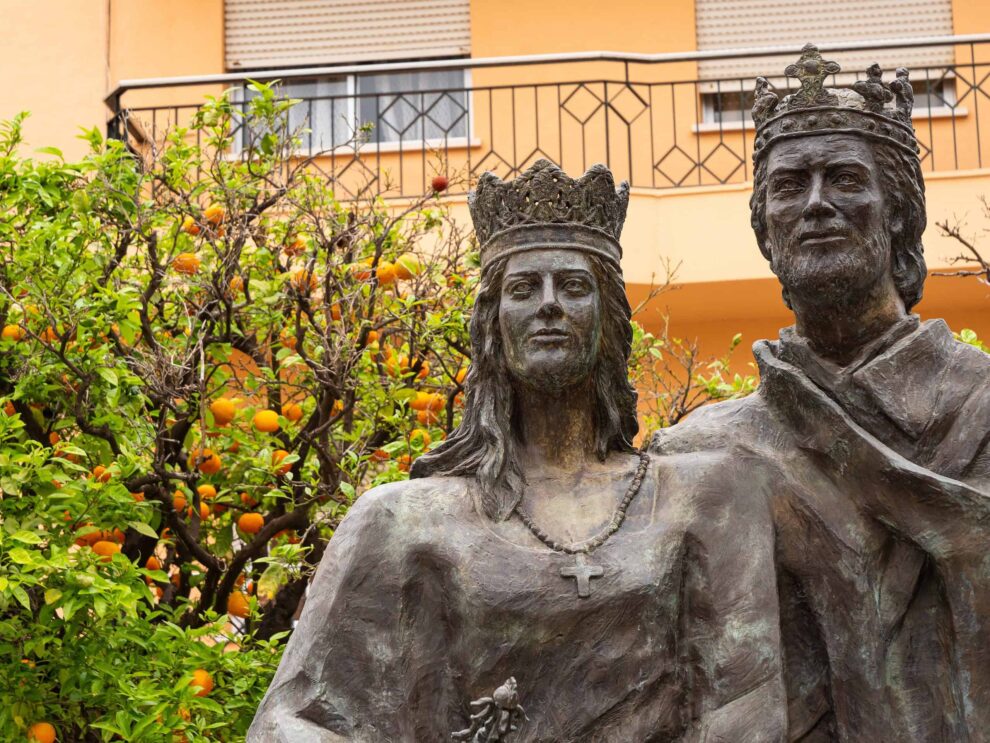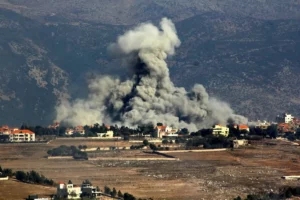They may be separated by seven centuries, but a commonality is clearly apparent when it comes to the Jewish people.
The collaboration between UNRWA, the U.N. agency solely dedicated to Palestinian refugees and their descendants, and the Hamas rulers of Gaza continues unabated.
Two episodes over the last week underscore that claim. On May 14, Israeli jets carried out a precision strike against a Hamas war room and weapons depot that was concealed beneath an UNRWA school in Nuseirat. Fifteen terrorists—10 of them members of Hamas’s elite Nukhba Force—were killed in the strike. Meanwhile, three days earlier, the Israelis released aerial surveillance footage of armed Palestinians in an UNRWA compound in the southern city of Rafah, where the IDF is facing off against four Hamas battalions. The video showed the gun-toting Palestinians milling inside the compound, from where they launched attacks on the gathering Israeli forces.
The intermingling of UNRWA facilities and personnel with Hamas and its nefarious aims has been a constant theme of Israeli messaging throughout the current war in the Gaza Strip. At the beginning of this year, it seemed as if other Western countries shared Israel’s concerns, with 18 of them, among them the United States, suspending funding to UNRWA. However, as the NGO UN Watch has documented, in the intervening period, nine of them have quietly restored their fiscal support. One of these countries was Germany, whose foreign ministry declared in an April 24 statement that UNRWA’s verbal willingness to implement the recommendations of an independent commission headed by former French Foreign Minister Catherine Colonna was enough to turn the money faucet back on. Israel’s vociferous objections—pointing out that Colonna had elided Jerusalem’s claim that more than 2,000 UNRWA staff members retain ties with Hamas—made no difference to the Germans, nor to the Japanese, or the Canadians or the other six nations who resumed financial assistance to the agency.
In the midst of all this, UNRWA received an award from the government of Spain—one of the countries that has maintained its funding throughout the conflict triggered by the Hamas pogrom in southern Israel on Oct. 7. The spectacle of a U.N. agency that indulges a terrorist group, whose tactics include the mass murder and rape of civilians for the crime of being Jews, being feted like this is, of course, deeply regrettable. But looked at from another angle, it is highly appropriate.
The award presented to UNRWA director general Philippe Lazzarini by Spanish Foreign Minister José Manuel Albares during his visit to New York on April 19 inducted him into the “Royal Order of Isabella the Catholic.” The “Isabella” referred to here is Queen Isabella I of Castile, who ruled Spain alongside her husband, King Ferdinand II, from 1474 until her death 30 years later. In 1492, at the height of the Spanish Inquisition, Isabella and Ferdinand issued an order for the ejection of Spain’s Jewish population, estimated to have been 300,000-strong.
The king and queen’s announcement of the expulsion—known as the Alhambra Decree—is on display, fittingly, at the United States Holocaust Memorial Museum in Washington, D.C. Spanish Jews were given four months to pack up their belongings and settle their affairs, a chaotic and painful process that left Spain as a country economically and culturally impoverished. Sultan Bayezid II of the Ottoman Empire, who offered shelter to some of these Jews (among them my own family, who lived for centuries under Turkish rule in the Balkans), poked fun at the Spanish monarchs, questioning the judgment of those who would degrade their own kingdom only to “enrich ours.” In making that observation, Bayezid inadvertently grasped one of the more curious aspects of Jew-hatred—that its advocates will push for it relentlessly, even when it doesn’t suit their own interests to do so.
One of the more curious aspects of Jew-hatred is that its advocates will push for it relentlessly, even when it doesn’t suit their own interests.
Few institutions would be as receptive as UNRWA when it comes to Spain expressing pride in a monarch who deservedly has the reputation as one of the worst persecutors of Jews in their history. The history of antisemitism has been captured in a simple formula: You have no right to live among us as Jews; you have no right to live among us; you have no right to live. Queen Isabella’s place on this spectrum is evident and unarguable. Equally, Hamas belongs there no less. The Iranian-backed organization doesn’t like Jews, doesn’t like Jews living among Muslims and doesn’t like Jews being alive at all. They may be separated by seven centuries, but Isabella and UNRWA, which has actively promoted Hamas-style antisemitism in its schools, have a huge amount in common when it comes to the Jewish people.
Were Hamas to succeed in its goal of eliminating Israel as a sovereign state, we might well expect an announcement to that end not dissimilar to the Alhambra Declaration. Those Jews who survived the destruction of their only state would, if they were lucky, be given four months to liquidate their assets, hand over their properties to “returning” Palestinian refugees and make their way out of the country. No doubt some would figure out a way to stay—probably by hiding their Jewish identities and attempting to integrate with the rest of the population, as those Jews who remained in Spain after the expulsion did. UNRWA, by a twist of historical irony, might even offer to shepherd their exit within parameters set by Hamas that would prevent forever any possibility of returning. While such a scenario may seem improbable today, if history has taught us anything, it’s that it’s not improbable tomorrow.
The history of antisemitism has been captured in a simple formula: You have no right to live among us as Jews; you have no right to live among us; you have no right to live.
Fundamentally, the problem here is that too many states—not just Turkey, Iran, Russia, North Korea, China and other citadels of authoritarian rule, but democracies as well—believe that the way to convince the Palestinians to accept peace is by kowtowing to their jealously guarded victimhood status.
By the end of this month, it’s likely that several European Union member states, including Spain and also Ireland, Malta, Slovenia and Belgium, will have unilaterally recognized an independent Palestinian state. Albares is one of the foreign ministers actively promoting the fiction that such a move will bolster, rather than undermine, the prospects for the creation of a Palestinian state alongside Israel that will coexist peacefully.
Deep down, you have to believe that Albares knows that’s simply not true—that most Palestinians, as successive opinion polls since Oct. 7 have borne out, regard a state alongside Israel not as a final settlement but a step towards conquering the entire land “from the river to the sea.” These are the stakes that Israel has to contend with when it deals with diplomats and other foreign officials quietly sympathetic to the idea that the Jewish state shouldn’t be there in the first place.

















Add Comment